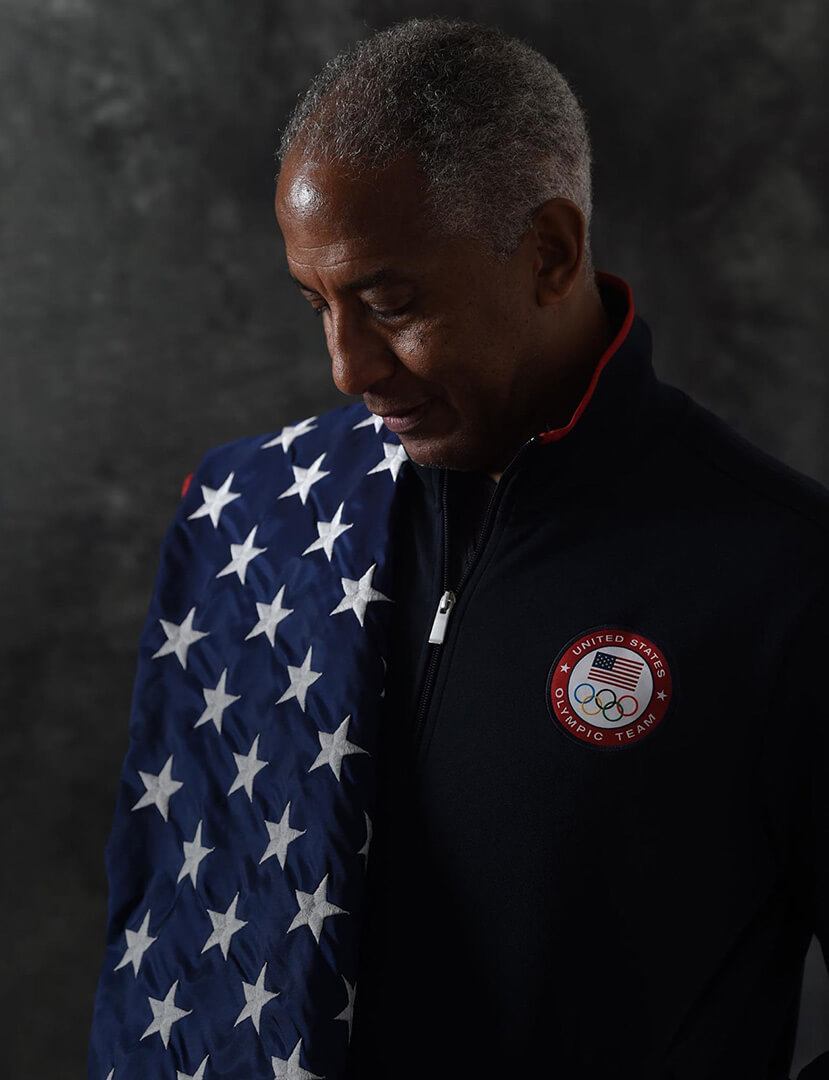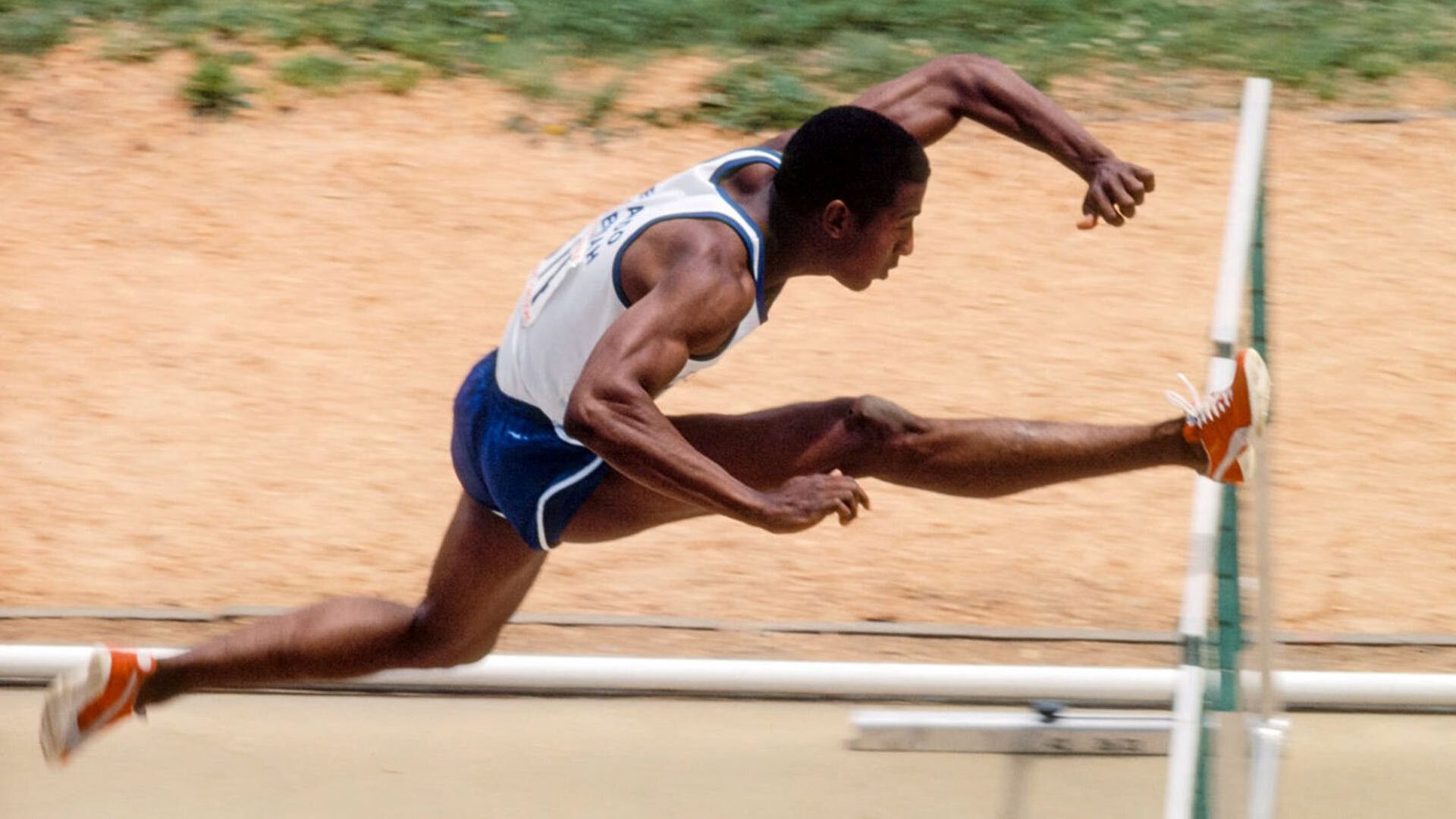- July 30, 2021
- By Doug Dull
“Don’t ever let one race define you.”
If anyone has lived that quote, it’s Renaldo Nehemiah ’81, perhaps the best 110-meter hurdler of all time.
He went on to become a Super Bowl-winning NFL player and a sports agent, but watching the 2020 Tokyo Olympics, he can’t help but reflect on his painful experience of the 1980 Olympic Games in Moscow, where he never made it to the starting line because of a U.S.-led boycott spurred by the Soviet invasion of Afghanistan.
Nehemiah couldn’t even talk about the episode for perhaps 20 years, and even now, he still has to correct people who misremember him as an Olympic champion. But he’s spent the years since turning the pain into wisdom.
“You’re more than one race, and if you were to wrap all your self-esteem and everything into that one race, I’d probably be disappointed in you because you’d be limiting yourself,” he said he tells his clients. “I always say that I’m living proof of that because I didn’t run in the Olympic Games."
 Fortunately, other races defined Nehemiah as one of the greatest track and field athletes of recent decades: He won three NCAA championships at Maryland, capturing the 60-yard hurdles indoors in 1978 and 1979, and the 110 hurdles outdoors in 1979. That year, Nehemiah also won the IAAF World Cup in 13.39 seconds. Between 1979 and 1981, he set the world record in the 110-meter hurdles three times, and was ranked No. 1 in the world for four seasons. In his career race at a meet in Zurich, he broke the 13-second mark in the 110 hurdles with a time of 12.93. It was also a world record that stood for eight years.
Fortunately, other races defined Nehemiah as one of the greatest track and field athletes of recent decades: He won three NCAA championships at Maryland, capturing the 60-yard hurdles indoors in 1978 and 1979, and the 110 hurdles outdoors in 1979. That year, Nehemiah also won the IAAF World Cup in 13.39 seconds. Between 1979 and 1981, he set the world record in the 110-meter hurdles three times, and was ranked No. 1 in the world for four seasons. In his career race at a meet in Zurich, he broke the 13-second mark in the 110 hurdles with a time of 12.93. It was also a world record that stood for eight years.
In early 1980, news stories suggested that President Jimmy Carter was considering a boycott of the Moscow Games to protest the USSR’s action in Afghanistan. Nehemiah clung to hope that the U.S. would instead allow the Summer Olympics to proceed just as the 1980 Winter Games had, including the U.S. men’s hockey team’s “Miracle on Ice” victory over the Russians.
“We just beat them on ice in their sport. So now we’re going to go to the Summer Olympics,” he recalled thinking.
But the U.S. became one of 65 nations to announce the boycott. For Nehemiah, who said he was just finding his stride, “It was painful. And I was angry. I mean, I was really angry.”
The United States went ahead with its Olympic trials anyway, and Nehemiah comfortably won his race with a time of 13.26.
“This was the most important thing for me, to represent my country,” he said. “And so I was an Olympian with nowhere to go.”
The lost opportunity to compete in the Olympics hardly ended his sporting career, even though it took some hard lefts. Following his world-record victory in Switzerland in August 1981, Nehemiah competed in ABC’s “Superstars” competition, pitting athletes from different sports. He recalled being befriended by NFL star wide receivers Dwight Clark and Cris Collinsworth, who were impressed by the hurdler’s raw speed.
“They kept saying, ‘(San Francisco 49ers head coach) Bill Walsh would love a guy like you,’” he said. “Why are you wasting your time as an amateur?”
He soon hung up—twice—on someone claiming to be Walsh, saying the second time, ‘Well, if you’re Bill Walsh, call my agent.”
His agent called soon after, and Nehemiah signed as a free-agent wide receiver with the 49ers. He played three seasons with the team and was a member of the Super Bowl champions in 1984.
Continuing uncertainty with Olympic competition, including Warsaw Pact threats to boycott the 1984 Los Angeles Summer Games, influenced what he admits was a hot-headed decision to switch sports.
“I’ve had so many years to reflect, so I can honestly say today, looking back, my opting to play professional football and give up track was a temper tantrum,” he said. “It was total disappointment in the system that had failed me.”
He appreciated that Walsh signed him to a four-year contract, since his track career was essentially over. Complicating matters at the time was a draconian limit on amateurism, disqualifying him from the Olympics.
Over the next few years, Nehemiah fought in court to have the amateurism limits changed, which didn’t help him personally, but helped others in the future.
“Those are things, when I sit here today and in years past, I look back and in spite of me maybe not reaping the benefits in my sport, other people can reap the benefit as a result of my efforts to prove a point.”
This article was excerpted from the Spring 2021 issue of One Maryland magazine, which goes to Terrapin Club members. Read the full article.
Topics
AthleticsTags
Track and Field